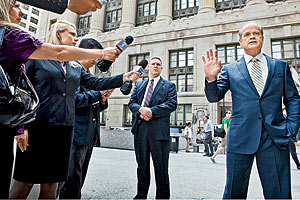In the opening scene of the new Chicago-set drama Boss, Mayor Thomas Kane sits in an abandoned slaughterhouse opposite a doctor who reveals his fate: Lewy body dementia, a rare disease most closely associated with Alzheimer’s. It’s a devastating diagnosis, and afterward, as he processes his grim future alone in his limo, you can’t help but ache for Kane, portrayed unflinchingly by Kelsey Grammer.
That is, until later in the episode, when this same man stuffs two human ears—secretly presented to him at a gala, neatly wrapped with a bow—down a garbage disposal. Then your sympathy might wane.
These scenes set the stage for the basic question at the core of Starz’s dark original cable TV series, which filmed here earlier this year and premieres on October 21: Is Kane a good person?
The answers will vary depending on the viewer. According to the show’s creator and executive producer, Farhad Safinia (Apocalypto), Kane represents American politicians everywhere: “A good mayor—or governor, or president—is a man who may do bad things but is a good leader. He may have to pretend he’s nice and morally upstanding, but the things we’re asking him to provide us require him to equivocate in ways that are horrifying.”
This duality will be familiar to Chicago audiences, who have long heard the axiom that it takes grease to run the city’s political machine. “Chicago is one of those rare cities that can go beyond being a character to being representative of a theme,” the Iranian-born, European-educated Safinia says. “Take, for example, the fact that various ethnic factions have fought to gain political power and formed allegiances even though they were sworn enemies. Or that many of the national social movements of the last hundred years—whether you’re looking at The Jungle and the labor movement or the upheavals during Daley’s reign in the 1960s—took spark in the city. Or the grandiose nature of Chicago’s politics, with politicians who are almost caricatures. In trying to tell the mythology of an American politician, I had to go for the city that embodies all of that.”
To underscore his point, Safinia references Roger Brown’s The Flight of Daedalus and Icarus, a mosaic at the entrance of 120 North LaSalle Street. Safinia visited the mosaic when he was in town filming the series, which shot in all the usual spots (the Loop, the Gold Coast) and in neighborhoods that aren’t usually captured by the cameras (Austin, Englewood). “In any other city, you would see the moment just after, when Icarus gets too close to the sun and his wings melt because they are made of wax. Only Chicago would depict the moment just before, where he’s actually flying close to the sun and everything’s just fine. It’s like the city is reaching up and has no sense of what the pitfalls might be. You look at people like [Richard J.] Daley or Bill Thompson or Cermak: Their ambition had no sense of boundary.”
Grammer, an executive producer of the show as well as its star, insists his character is not based on any single mayor. “He’s an amalgam of all men who have had the gall and the chutzpah to say, ‘I will run this city,’” Grammer says. Playing a politician whose personal life is as critically examined as his professional one is a good fit for the 56-year-old actor, who experienced a bitter and public split earlier this year when he divorced the Real Housewives of Beverly Hills star Camille Grammer and married 29-year-old Kayte Walsh. “For some weird, tortured reason, to be in the throes of turmoil and change and in the public awareness—I think that’s got to show up onscreen somehow,” he says. “People won’t say, ‘Oh look! That’s really about this,’ but there have been some sublime moments in which my own life and the character’s life have taken a little ride together.”
Local viewers won’t see Bravo-style reality TV, but they’ll likely recognize one early ripped-from-the-newspaper plot line, which revolves around the expansion of O’Hare into the grounds of a neighboring cemetery. Just don’t expect Rahm to make a cameo.



